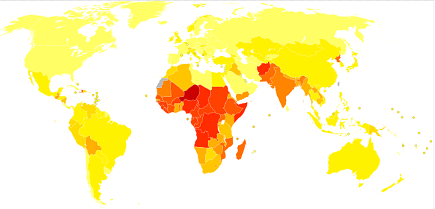So apparently there is something of an outbreak of pertussis, a.k.a. Whooping Cough, in California. Not Calcutta. Not Khartoum. California. The one on the left hand side of the wealthiest nation on the planet.
Pertussis. In California. How does that happen, like, ever in the U.S. let alone in large enough clusters to attract notice? Pertussis is one of the many diseases that we consider largely eradicated in the "developed" world, i.e. the parts of the globe with reliable systems in place for water treatment and waste removal. Nobody in the U.S. should be getting whooping cough anymore than they should be getting monkeypox, filariasis, the measles, or yellow fever. And none of those diseases are to be expected in this country because reliable vaccines are available, often free of charge, everywhere in the Western world.
To put the California issue in context, this is where pertussis is most prevalent:
See that dark red one, California? That is Niger. The same Niger ranked 182nd out of 182 nations in the U.N. Human Development Index. While it has little in common with California (except for Merced…am I right people? *rimshot*) a growing number of Californians are imitating the people of Niger in one respect: they are not vaccinated against basic, easily preventable diseases long ago banished to the undeveloped parts of the globe.

Thanks a pantload, retards!
America – and the rest of the planet, for that matter – has a long tradition of backward knuckleheads who prefer hokum to science and folk remedies to actual medical care. This is what poorly educated people do. They reject things they don't understand.
online pharmacy lexapro best drugstore for you
This is why we educate ourselves as a nation, to teach people not to reflexively trust their neanderthal instincts or revert to the intellectual equivalent of shamanism when confronted with the products of an educated society. But now such impulses have the appearance of mainstream legitimacy (Just look at all this information on the internet! Some of these people look, like, real scientific and stuff!) and rather than dropping the hammer on it with maximum force, the media and your more gullible friends and relatives nurture it along.
online pharmacy prednisone best drugstore for you
Why? If Jenny McCarthy started a movement claiming that Pepsi or Centrum Vitamins cause autism, you would recoil in horror from the sheer violence with which the mainstream media and society at large would beat her down. It would be like watching a small puppy flattened under a steamroller. Yet in the interest of "controversy" or ratings (the stay-at-home mom audience being a large one, and being a Mommy who Knows My Child being a more valid form of medical expertise than actually practicing medicine when it comes to the vaccine-autism question) this ridiculous "movement" is entertained up to the highest levels. All of this, of course, is endlessly fueled by the internet: transparently stupid conspiracist websites, echo chamber "communities" for the afflicted (be it with illness or imbecility), and syrupy, drooling MommyBlogs where people who know a great many things As a Parent explain why science is wrong and post hoc most definitely allows us to conclude propter hoc. Every time a Mommy explains how MMR gave little Ethan autism, God adopts and drowns a helpless kitten.
buy augmentin online buy augmentin no prescription
The internet is the greatest thing to happen to idiots since Walter Freeman pioneered the transorbital lobotomy, and it has done almost as much to make them even dumber. Let's really go for the gold and see if we can't work up a nice outbreak of polio, diphtheria, or tetanus right on the doorstep of some of the finest medical and scientific infrastructure on Earth.
buy clomid online buy clomid no prescription
You can do it, Jenny.


